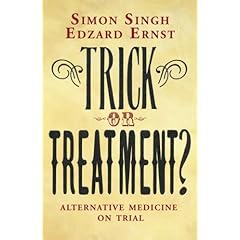Trick or Treatment?: Alternative Medicine on Trial by Simon Singh & Edzard Ernst, published 2008, Bantam press.
The two authors have an interesting mix of background: Simon Singh is a Particle Physicist who has made a career in science broadcasting and writing, while Edzard Ernst is the world's first professor of complementary medicine.
From my perspective as a scientist, the willingness of the public to embrace unproven alternative medicine (often based on irrational and superstitious thoughts) has been nothing short of astonishing. In the year of the 60th anniversary of the UK's most important social development since the Second World War - the National Health Service - it is rather depressing to see the descent into mediaeval superstition. This book aims to reveal the truth about alternative medicine, and set it in the context of modern evidence-based medicine. And, in my opinion it succeeds very well indeed.
The opening chapter covers the emergence of the idea of clinical trials, with the early example by which the use of lemons as a cure for scurvy was discovered. This is set in the context of unhelpful treatments such as blood-letting. The book then moves on to a detailed treatment of four major systems of complementary medicine: acupuncture, homeopathy, chiropractic therapy and Herbalism. These chapters are well-structured, using the discussion of the validity (or lack of validity) of these "therapies" as a framework on which more detailed discussions of the nature of evidence, particularly the importance of double blind trials, and meta-analyses are presented. This structure works very well in my opinion.
The authors conclude that most of the benefits accruing from these "therapies" are effectively a placebo effect, and spend the sixth chapter discussing the ethics of practising medicine while using a dishonest placebo strategy,
Finally, and appendix summarising 36 or so alternative therapies, many of which are frankly absurd.
To summarise, this book is a clearly written description of alternative "therapies" in the context of modern evidence-based medicine. Excellent.
See also the Quackometer website. and the Quackwatch website. David Colquhoun's website is also well worth checking out.

